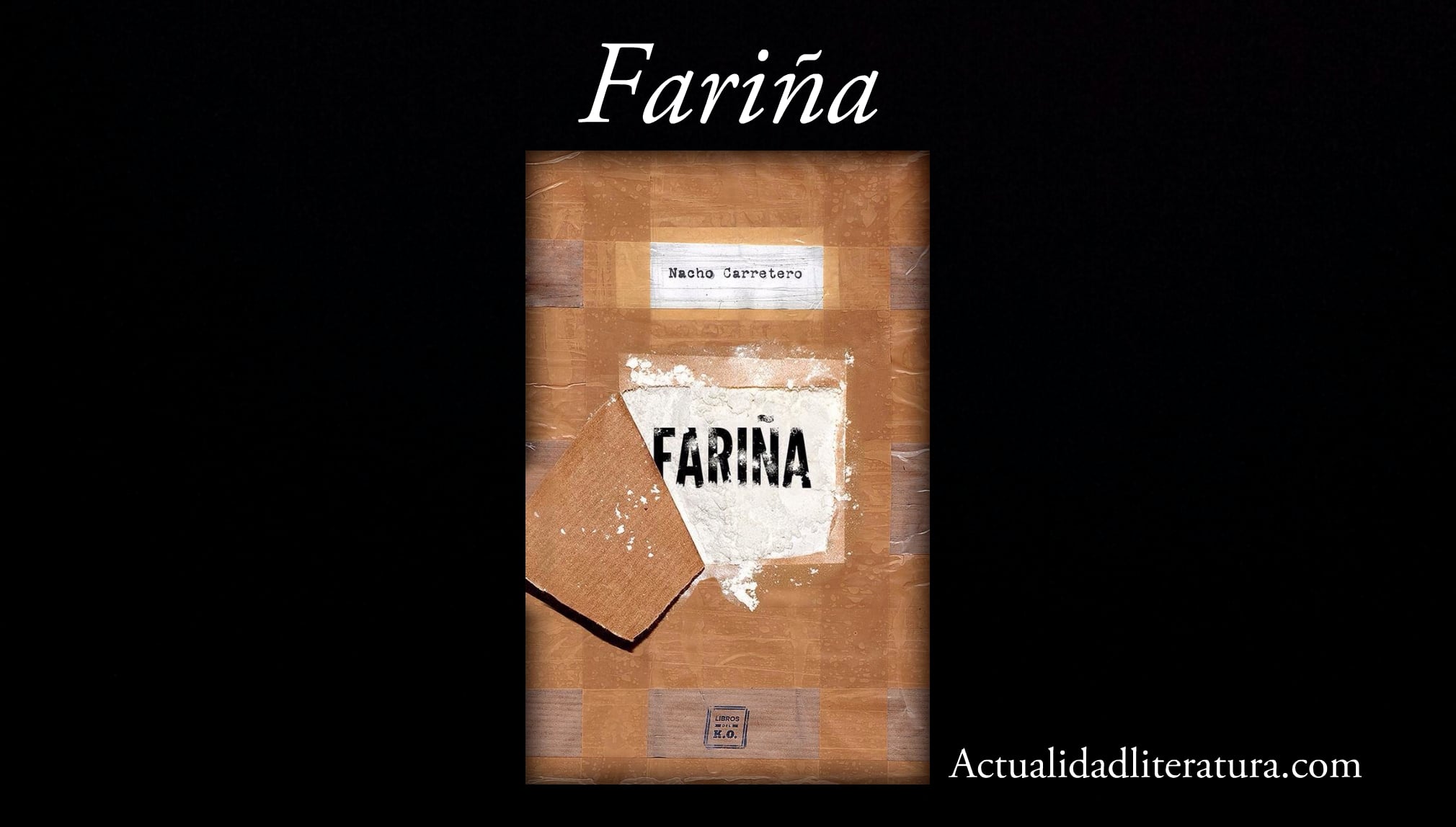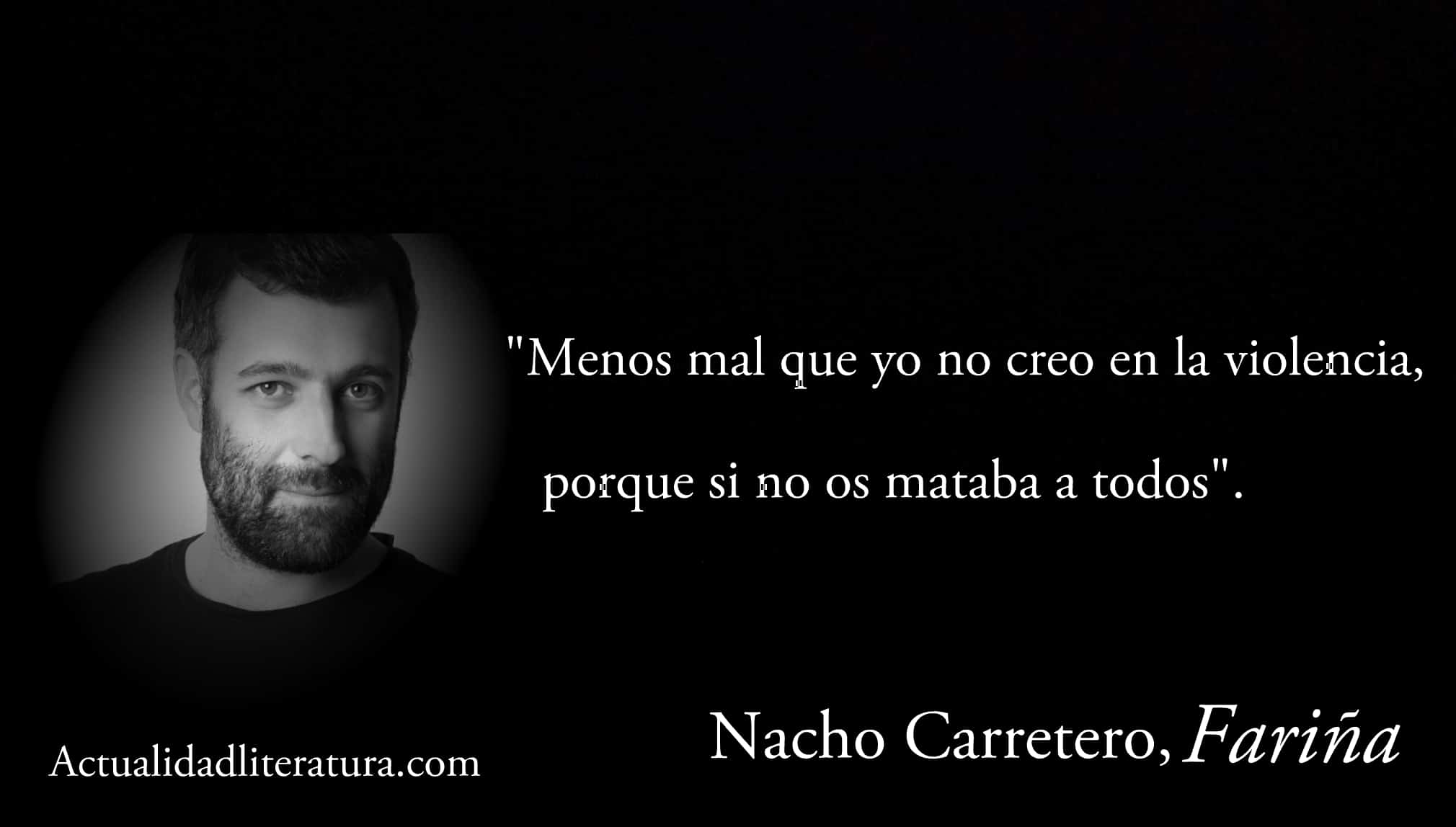
Farina.
The book Fariña. History and indiscretions of drug trafficking in Galicia, is one of the most controversial titles of recent years in Spain. Especially after a court order was issued in March 2018 that ordered to suspend its commercialization. The reason: alleged violation of the right to honor of one of the persons mentioned in the text.
In any case, the provision was revoked four months later. Actually, the lawsuit contributed to (even more) the editorial success of Fariña, surpassing the 100.000 copies sold to date. Likewise, this book by the Spanish journalist Nacho Carretero is the basis of the plot of the series Fariña, launched by Movistar Plus in September 2019.
About the Author
Nacho Carretero (A Coruña, 1981) is a journalist and writer with a fairly long career. Aside from his investigations into drug trafficking in Galicia, Carretero has completed shocking reports on the genocide in Rwanda, Ebola in Africa, the Syrian civil war and the forest fires in Galicia during 2017.
The legal status of Fariña's book
Between March and June 2018, a “precautionary kidnapping” ordered by Judge Alejandra Fontana was in force, at the request of José Alfredo Bea Gondar, former mayor of O Grove (Pontevedra). The process was part of his lawsuit against Nacho Carretero and the company Libros del KO. Additionally, the plaintiff claimed compensation of € 500.000, which threatened the survival of the publisher.
However, On June 22, 2018, the Provincial Court of Madrid revoked the commercial cessation. Whatever happens this book will always be controversial and uncomfortable. The word "fariña" means "flour" in Galician (one of the colloquial ways to refer to cocaine). The cover is also a declaration of intent: it simulates an open bundle of drugs.

Nacho Carter.
Other books by Nacho Carretero (both released in 2018):
- It seems better to us (Libros del KO), where he makes a historical review and addresses the sports and institutional crisis of Deportivo de La Coruña.
- In the corridor of the cave (Editorial Espasa), referring to the case of Pablo Ibar, a Spaniard sentenced to death in the United States in 2000. But in 2016 the Florida Supreme Court concluded that it did not have a fair trial, that is, it must be repeated.
Historical context of smuggling in Galicia
Countless hidden enclaves, intricate waterways and nooks, make Galicia an ideal region for smuggling groups to flourish. Any criminal with sufficient knowledge of the area has a good chance of hiding and escaping. In this regard, Carretero completed an excellent chronology on a tradition established for several centuries.
A "justified" lifestyle
Historically neglect by central government authorities has created the “perfect” social debt conditions for smuggling to flourish. For this reason, trafficking - not only of prohibited drugs - has been well regarded on the Galician coast. It is simply perceived as an alternative procedure to obtain money.
Those involved usually justify their actions by claiming that "their activities do not harm anyone". They consider smuggling as a “ruble” that drives other sectors of the economy, “more business, more investment, more work for everyone”. So the traffic that began with bicycles in the mid-70th century and continued with tobacco in the 80s, led to drugs during the 90s and XNUMXs.
The book Fariña evidences a cultural problem
You can buy the book here: Fariña
Self-deception
"Traffic does not affect local populations" is a phrase repeated to cover up subsequent tragedies. It is an apology established in countries where the cultivation and processing of plants such as the coca leaf or marijuana is common.. At this point, the testimonies obtained from drug addicts in Galicia are extremely important.
By delving into the problem of drug addiction in that region, Carretero completely dismantles the myth of "consumption that occurs elsewhere". But short-legged excuses are not the only links with drug-producing countries. Well, the connections with the South American cartels —mainly with Pablo Escobar's— have been very solid.
"A new Sicily"
Obviously, the establishment of a true large-scale drug trafficking network requires the incompetence and / or complicity of the authorities. Politicians, police, military ... to a greater or lesser extent, all have their share of responsibility. Otherwise, criminal clans would have no place. What's more, Carretero does not exclude Galician society as part of the problem.

Quote by Nacho Carretero. in Fariña.
Therefore, the investigation ended up stripping each of the links in the drug trade in Galicia. Then, many, many people accustomed to impunity ended up “spattered”. In fact, the lawsuit received was a “normal” consequence; more are not unlikely to appear in the not too distant future.
Top-notch journalism
Carretero (and the publisher) have shown their courage by doing a job as risky as it is necessary. En Fariña declarations of capos, policemen, judges, journalists and local inhabitants appear that demonstrate the permanence of the drug trafficking problem until today.
On the other hand, the information appears very well schematized, which facilitates the understanding of the magnitude of the traffic with its respective edges. Also, lhe infographic provides reliable data on clans, routes, and transportation methods. Particularly impressive are the details on the macro-gliders used to move cargo across the estuaries.
A strong wake-up call to Spanish society
The audiovisual media are partially guilty of generating empathy towards the big Mexican or Colombian drug traffickers. Today, on networks like Netflix or Fox, television series focused on these characters are quite common and successful. Thus, Carretero makes it clear that common people's admiration for the drug trafficker is a huge problem.
Spaniards normally regard news of violent clashes between gangsters as a foreign matter.. The same happens with the alarming consumption statistics. When the reality is very different, "they have the monster at home." In addition, it is associated with a series of misfortunes such as human trafficking, corruption and the degradation of society.